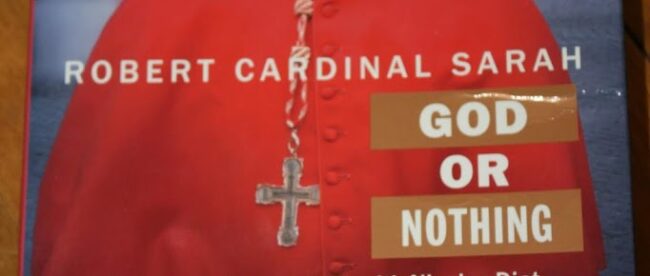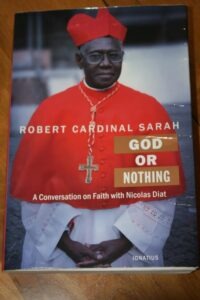In his conversation with Nicolas Diat, Robert Cardinal Sarah gives us a strong and inspiring insight of the Catholic faith. His book is certainly an important contribution to the New Evangelization which St. Pope John Paul II proclaimed. Anyone looking for answers on contemporary issues such as abortion, euthanasia, gender, homosexuality and poverty in the context of the Gospel, will find the correct and truthful answers in Sarah’s book God or Nothing.
His book is not a book to read in one night, in fact it took me several weeks to finish. I also found it hard to read the book without a pencil in my hand, ready to mark out important phrases. Almost on every page I found a wise and enlightening expression.
Robert Cardinal Sarah was born in a small village in Guinea, West Africa, and became deeply connected with the Church, thanks to missionary priests from France. Their shining example of sacrifice and love towards God and people inspired him to become a priest himself. At the age of thirty-four he was ordained the youngest bishop of the Church, and later-on John Paul II. made him Archbishop of Conakry, Guinea. In the 70’s his country suffered greatly under communist dictatorship; even Sarah was under threat of being assassinated.
John Paul II. appointed him to the Secretary of the Congregation for the Evangelization of Peoples in Rome and Pope Benedict XVI. named him Cardinal and appointed him Prefect of the Pontifical Council Cor Unum. Since 2014 Cardinal Sarah is Prefect of the Congregation for Divine Worship and the Discipline of the Sacraments.
God or Nothing has received numerous praise: among others, Archbishop of Denver commented: “An essential read for any person seeking an authentic witness to Christ in modern society.” and Raymond Arroyo of EWTN mentioned: “Cardinal Sarah’s voice carries the unmistakable ring of a prophet.”
Robert Cardinal Sarah about the Church:
The Church is like the moon. She does not shine with her own light but reflects the light of Christ. Indeed, just as the moon without the sun is dark, opaque, and invisible, so too is the Church if she separates herself from Christ, true God and true man. Ecclesiology shows that it depends on Christology and is connected to it.
Faced with today’s moral crisis, in particular the crisis of marriage and the family, the Church can contribute to the search for just and constructive solutions, but she has no other option but to take part in that search by vigorously citing the unique and distinctive things that faith in Jesus Christ brings to the human enterprise. In this sense, it is not possible to imagine any conflict or rension whatsoever between matisterial teaching and pastoral practice.

